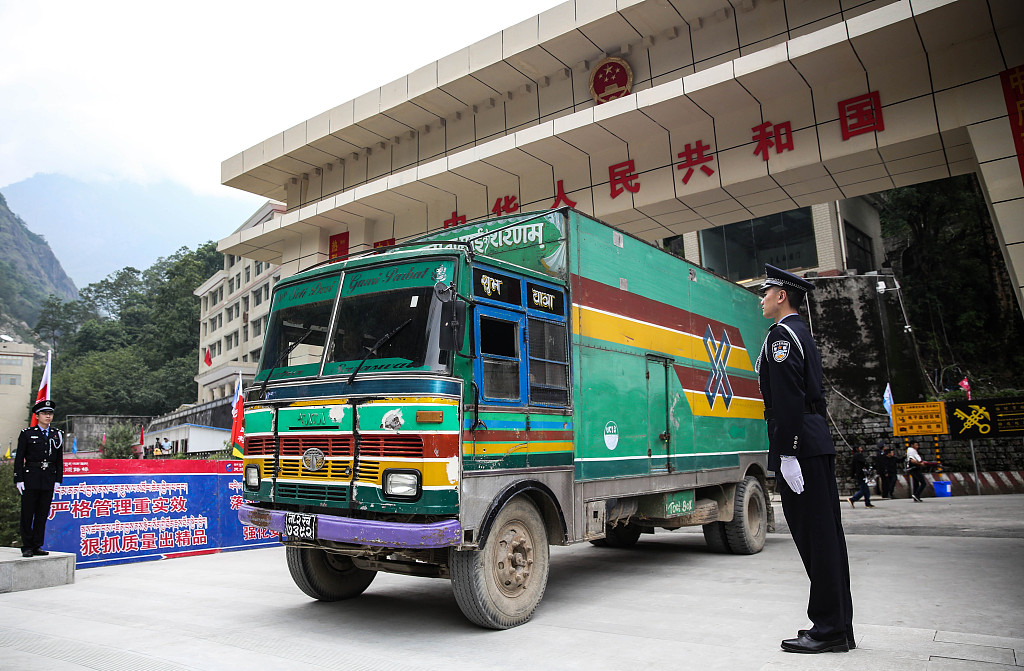Revival of China-Nepal border port can boost bilateral trade
- By Mahendra Subedi
 0 Comment(s)
0 Comment(s) Print
Print E-mail China.org.cn, June 7, 2019
E-mail China.org.cn, June 7, 2019

The Nepal-China Zhangmu-Kodari port has come back into operation with the passage of four cargo vehicles that entered Nepal on May 29, marking a significant step in cementing bilateral trade ties between the two countries and benefiting the lives of local people.
The Tatopani border point on the Nepali side of the Zhangmu-Kodari port was severely damaged by an earthquake in 2015. Ahead of the reconstruction of the port, top-level political leaders and officials from China and Nepal held a series of talks to expedite the process, and the Chinese side has since invested enormous human resources and materials into the project. Now, with the recent passage, trade through the Tatopani border is officially restored.
The Zhangmu-Kodari border port is a vital gateway between China and Nepal, responsible for 90% of the volume of road trade between the two countries prior to 2015. On the Nepal side, it remained fully closed for more than four years, due to severe damage to the port and other physical infrastructure by the devastating earthquake that killed more than 9,000 people.
Inaugurating the reopening of the port, Nepal's Commerce Minister Matrika Yadav said that the resumption of the Zhangmu-Kodari border point is an important chapter of Nepal-China relations, adding that it will soon serve to boost human mobility in the region as well. The border area was reconstructed with an eye to geological disaster prevention, power supply, road reconstruction, water conservation, joint inspection and cross-border facilities, all of which are intended to meet the conditions for resumed cargo transport.
Similarly, Chinese Ambassador to Nepal Hou Yanqi vowed that China and Nepal will continue to strengthen cooperation, to ensure the safety and operation of the port and roads. He added that they will improve the infrastructure around the port, bringing new vitality to this vein linking the two countries.
For Nepalis, the Tatopani border point is an epitome of Nepal-China relations for many reasons. It is not only pivotal to the import and export of goods to and from Nepal, but will also serve as an important gateway for tourists from China and the rest of the world. It is also a lifeline for hundreds of thousands of people along the Araniko Highway. Most importantly, it will improve life for the people living along the border area and adjoining regions.
Furthermore, the resumption of the Tatopani border point will boost economic and business activities between Nepal and China. Investment from the private sector is expected to pour into tourism, infrastructure development, construction and small-scale industries, while those families displaced after the earthquake will be able to return to their towns and resume their livelihoods.
Similarly, urbanization in the areas along the highway will gain further momentum thanks to the revival of the Tatopani border point. Expenses for Nepali importers should be further reduced as well, compared to the Keyrung point in Rasuwa district. Moreover, the revenue collection from the Tatopani point, which was about 5 billion Nepali rupees before the earthquake, is likely to surge even higher with the increased import-export volume between the two countries.
Due to the geographical advantage of Tatopani, the closest border point to Nepal's capital Kathmandu, the time and cost of supplying goods and commodities to the city are also estimated to be greatly reduced. Moreover, the Nepali side will benefit from economic growth in China's neighboring Tibet Autonomous Region.
As Nepal is receiving large-scale assistance from China after joining the Belt and Road Initiative, the reopening of the Tatopani border point can work as a cornerstone for Nepal's development, stability and prosperity. Let's hope that life returns to normal and can become prosperous once more in the quake-hit Tatopani area.
Mahendra Subedi is a social researcher and commentator from Nepal.
Opinion articles reflect the views of their authors, not necessarily those of China.org.cn.
If you would like to contribute, please contact us at opinion@china.org.cn.






Go to Forum >>0 Comment(s)